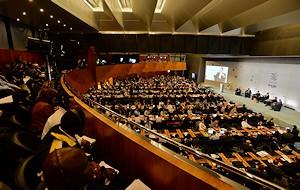MPs will meet in Geneva on 1 October for the Parliamentary session within the framework of the WTO Public Forum 2014 to address the oversight role of parliaments in the post-Bali agenda.
The meeting takes place at a crucial time as the fate of the historical agreement reached by WTO Members in Bali, Indonesia in December 2013 to introduce trade facilitation measures is unclear due to disagreements over food security. Governments now have the responsibility to find a solution to the deadlock so the agreement which could create more than an estimated US$1 trillion in world export gains, can come into force. Parliaments, for their part, must play a central role in overseeing current negotiations and in scrutinizing the implementation of commitments should WTO Members overcome the current impasse.
Five panelists, Bernd Lange and Helmut Scholz, Members of the European Parliament, Ablassé Ouedraogo, Burkinabe MP, Kil Jeong-woo, Korean MP, and Arancha González, Executive Director or the International Trade Centre (ITC), will lead the debate at the parliamentary event. The session will also be the opportunity to instill new energy into the legislative dimension of the multilateral trade system and to convey to the WTO the concerns and aspirations of citizens, business and other stakeholders. This approach is entirely in line with the title of this year´s WTO Public Forum: “Why trade matters to everyone” Jointly organized by IPU and the European Parliament, the Parliamentary session has become a tradition within the Public Forum, a three-day event gathering over 1,500 representatives from civil society, academia, business, the media, governments, MPs and inter-governmental organizations.





